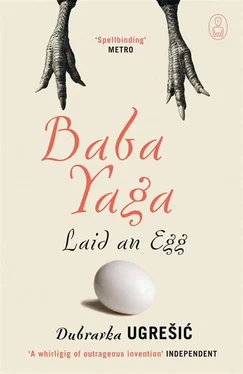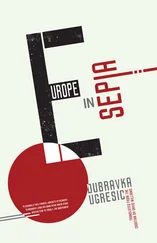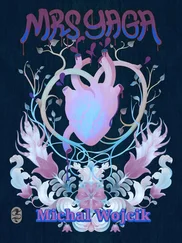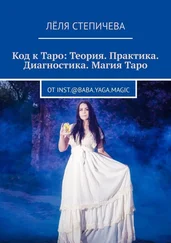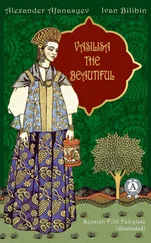Baba Yaga’s character emerged from oral traditions, innumer able nameless storytellers, male and female, who built it up and added to it over many decades. She is a collective work, and a collective mirror. Her biography begins in better times, when she was the Golden Baba, the Great Goddess, Earth Mother, Mokosh. With the transition to patriarchy, she lost her power and became an outlawed horror who still manages to prevail through sheer cunning. Today Baba Yaga ekes a life in her hut like a foetus in the womb or a corpse in a tomb.
In modern terms, Baba Yaga is a ‘dissident’, beyond the pale, isolated, a spinster, an old fright, a loser. She never married, and apparently has no friends. If she had any lovers, their names are not known. She does not care for children, she is no devoted mother, nor – despite her advanced years – has she become a granny surrounded by beloved grandchildren. She is not even a good cook. Her function is at once crucial and marginal: ‘courteous’ or ‘rude’ heroes stop when they reach her hut, they eat, they drink, they steam in her bath, take her advice, accept magical gifts that help them to reach their goals and then disappear. They never come back with a bunch of flowers and a box of chocolates.
The chief reason for Baba Yaga’s heresy is her great age. Her dissidence only takes place within the system of life-values that we ourselves have made; in other words, we forced her into heresy. Baba Yaga does not live her life; she undergoes it. She is an old maid or virgin, who serves as a screen for the projection of (castrating) male and (self-punishing) female fantasies. We have stripped away the mere possibility of accomplishment on any level and left her nothing but a few tricks to scare little children with. We have pushed her to the very edge, in the forest, deep in our own subconscious; we have made a symbolical doll and assigned her a symbolical lapot . [53]Baba Yaga is a surrogate-woman, she is here to get old instead of us, to be old instead of us, to be punished instead of us. Hers is the drama of old age, hers the story of excommunication, forced expulsion, invisibility, brutal marginalisation. On this point, our own fear acts like acid, which dissolves actual human drama into grotesque clownishness. Clownishness, it is true, does not necessarily have a negative overtone: on the contrary, in principle it affirms human vitality and the momentary victory over death! [54]
Remarks
It is interesting that your author chose to foreground old age as the most relevant theme, although in truth she gave clear warning of this in her introduction (‘At first you don’t see them…’). Precisely because the author promotes this theme above the others, she achieves an interesting re-semantisation of all the elements linked to the character of Baba Yaga. I shan’t analyse this more deeply, because that’s not my job, but I will mention one example. The title of the first part, ‘Go there – I know not where – and bring me back a thing I lack’, is the slightly changed title of a Russian fairytale (Go there, I know not where, bring back I know not what / Pojdi tuda – ne znaju kuda – prinesi to – ne znaju chto) and one of Baba Yaga’s most popular riddles. And the title of the second part – ‘Ask me no questions and I’ll tell you no lies’ – belongs to one of Baba Yaga’s sayings in a folktale Vassilisa the Beautiful, although it differs a bit in its meaning from the original (Sprashivaj; tol’ko ne vsjakij vopros k dobru vedet /, Ask, but not every question leads to something good). For some reason your author left out the next bit of Baba Yaga’s reply, which goes: ‘If you know too much, you grow old too soon!’(Mnogo budesh znat’, skoro sostareesh’sja!) All in all, the riddle is meant to prove Baba Yaga’s wisdom and manipulative powers. In your author’s text, Baba Yaga’s riddle suggests the opposite: deeply moving senility. There are other such details. Rereading your author’s text through the prism of Baba Yaga, and vice versa, once again reading Baba Yaga through the thematic prism of old age that your author provides, is a refreshing experience. Don’t let’s forget that epochs of history, cultures and whole civilisations are the result of a struggle for meaning. Once, long ago, Baba Yaga was the Great Goddess, the Golden Baba. Living through the long and burdensome history of her own degradation, Baba Yaga has come down to our own day as, unfortunately, her own caricature.
BABA YAGAS OF THE WORLD, UNITE!
Baba Yaga is a ‘dissident’, excommunicated, reclusive, an eyesore, a failure, but she is neither alone nor lonely. In many mythic and ritual folklore traditions besides the Slavic ones, she has innumerable sisters.
The Slovak Ježibaba(also Jenžibaba, or in Czech, Jahababa or Jahodababa) has a nose like a pot and a wide, fat mouth. She uses different stratagems to get her way: she turns princesses into frogs, and can turn herself into a frog or snake. Ježibaba is polycephalic: she can have seven, nine or twelve heads. Polycephaly, cannibalism, metamorphosis and great wickedness are the chief traits of this dangerous Czecho-Slovak Ježibaba. She possesses magical objects: shoes for walking on water, a skull that can bring rain, a golden apple, a golden purse, a stick that turns anything living into stone. Ježibaba often comes into contact with hunters who are hunting the forest animals in her vicinity.
There is an ancient female terror in the folklore of the Serbs, Croats, Bosnians, Slovenes, Macedonians and Montenegrins. She is called Baba Roga, Baba Jega, Gvozdenzuba(Irontooth). These peoples are much more afraid of their local witches and sprites than of Baba Yaga. Baba Roga is a bugbear that very few people take seriously, and in that sense it is hard to compare her with the Russian Baba Yaga. Serbian folklore, to be fair, has the Forest Mother ( Šumska majka ), who combines the characteristics of witch, water-nymph, mountain fairy and Baba Yaga. The Forest Motheris described as a young woman, full-breasted, with long, black, wanton hair and long nails (though she can also be old, ugly and toothless). She shows herself to people naked or dressed in white. The Forest Mother has the power to turn herself into a haystack, a turkey, a cow, a pig, a dog or a horse. She most often appears at midnight. She is skittish, she attacks the newborn babes and infants, but she defends them too. She knows how to cure barren women with preparations of forest herbs. The Forest Mother supposedly has a beautiful voice and is unusually sensual: she often waylays men, leading them deep into the woods, where she has sexual intercourse with them.
Instead of Baba Yaga, the Bulgarians have the Mountain Mother( Gorska maika ), who causes insomnia among little children, as well as ‘the witch Mag’osnica ’, the Samodiva (a sort of Bulgarian Rusalka ) and the Lamia , a female monster, who is a Slavic derivation from the ancient Greek creature of the same name.
The Romanian Mamapadureilives in the woods in a hut with hen’s legs. The hut is surrounded by a palisade fence with human skulls stuck on the posts. She steals little children and turns them into trees. Baba Cloanta(Jaws) is a tall, ugly old hag with teeth like rakes. She guards a barrel of human souls. Baba Coajais a child-killer with a long glass nose, one leg made of iron, and nails of brass. Baba Harcalives in the oven and steals stars out of the sky. The Romanian equivalent of Serbian St. Petka (Friday) or St. Paraskeva is Sfinta Vineri, who oversees women’s weaving work. She looks human, but her hen’s foot gives her away.
Читать дальше
